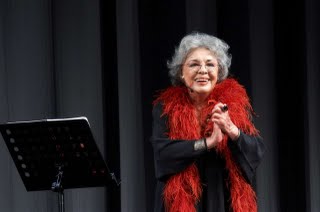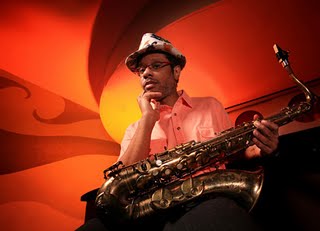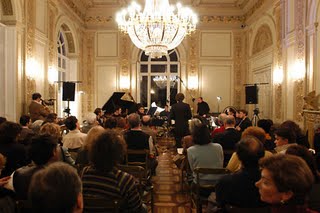Contemporary Music in Rome
 By Giuseppe Pennisi
By Giuseppe PennisiNot even Italians know if Rome can still claim to be the capital of melodrama or of other types of opera, but it can instead claim to be – along with Berlin and Paris – one of today’s capitals of contemporary music such as electro-acoustic and live electronics. In 2009, the hours of contemporary music performed in Roman concert halls and opera houses rivaled the number performed in Berlin. There would have been even more contemporary music in the Italian than the German Capital, if it were not for the Teatro dell’Opera’s financial crisis; now under direct special management by the City, the number of modern operas scheduled to be performed in the smaller Teatro Nazionale had to be deferred to the next season or cancelled altogether.
Secretary General of the Japan Electronic Keyboard Society Suguru Agata, one of the major international specialists of electronic music, made a special trip to Rome to analyze how electronic music is performed at the Piccolo Lirico. This is a small – only 150 seats – wholly private opera house where Tosca and Madama Butterfly are shown re-arranged for live electronics. Five electronic keyboards are played by five professional pianists to simulate the sound of 60 instruments; accompanying them are young singers, computerized sets and live electronics. This production of Tosca has had over 400 performances. Mr. Agata has brought his mission’s results to the Showa Music University with a view to include them in the Open Research Project of new techniques in electronic music and electro-acoustics.
In the last few weeks of 2009, there
 has been a fervor of contemporary music initiatives. In November, in the Sala di Via dei Greci dell’Accademia di Santa Cecilia, the second EMUFest, a major International festival of electronic music and electro-acustics took place. It was a success for experimental composers from Italy (including Marcello Filotei and Nicola Sani), the USA (Larry Matthews Gaab), Argentinia (Jorge Luis Dad Levi) and many other countries. There was also an international ensemble, with a large American presence, performing at the essenzialmente Usa presenta of the Istituzione Universitaria dei Concerti in a program titled MEV (Musica Elettronica Viva / Live Electronic Music) – Grande Raccordo Anulare (the Beltway).
has been a fervor of contemporary music initiatives. In November, in the Sala di Via dei Greci dell’Accademia di Santa Cecilia, the second EMUFest, a major International festival of electronic music and electro-acustics took place. It was a success for experimental composers from Italy (including Marcello Filotei and Nicola Sani), the USA (Larry Matthews Gaab), Argentinia (Jorge Luis Dad Levi) and many other countries. There was also an international ensemble, with a large American presence, performing at the essenzialmente Usa presenta of the Istituzione Universitaria dei Concerti in a program titled MEV (Musica Elettronica Viva / Live Electronic Music) – Grande Raccordo Anulare (the Beltway).At the Parco della Musica – a complex of three concert halls and a Studio Theatre – an international jazz festival is coming to completion; in early December the world premiere of Philip Glass’ latest opera Le Streghe di Venezia (The witches of Venice) is planned; another world premiere is scheduled (again at the Parco della Musica) in January, the last composition by Hans Werner Henze, Immolazione (Immolation). Glass, now 72, needs no introduction to the North American music audience. Henze, 82, is known as the prolific composer who made dodecaphonic music accessible to large audiences through his 16 operas (to date), 10 Symphonies and several chamber music and ballet compositions. Glass and Henze are quite different but they are both recognized authorities in contemporary music.
In the cozy Sala Casella in the garden of the Palazzina Vagnuzzi (the headquarters of the Accademia Filarmonica Romana), three new chamber operas by Italian young- and middle aged-composers will be unveiled in mid-December: one of them is staged by the German El Cimarron ensemble and due for a tour of the Iberian Peninsula. Check back here later for my review of the performance.
The real major event, however, i
 s the 46th Nuova Consonanza Festival. Nuova Consonanza is one of the most important contemporary music associations in Europe. Its annual Festival attracts musicians from the five continents to Rome. This year, the Festival started November 18th in the Grand Salon of Villa Medici – the Roman Headquarters of the Académie de France. The opening program was titled Après Boulez and featured the music of Luciano Berio, Gerard Grisey, Patrizio Esposito and Yann Robin. Its last concert will be on December 21st and will feature Portrait by Salvatore Sciarrino, an internationally well known Italian contemporary composer. On November 21st, there was the now traditional marathon of live elecytronics and eletrco-acustics, a series of concerts from 4:30 pm to midnight in the Villa Aurelia al Gianicolo, one of the Romen “homes” of the American Academy in Rome; as it is the guest house of the fellow artists, it is seldom opened to the public. An uninterrupted flow of young musicians were attracted by the admission of just €10, with an additional €8 providing them with a full dinner.
s the 46th Nuova Consonanza Festival. Nuova Consonanza is one of the most important contemporary music associations in Europe. Its annual Festival attracts musicians from the five continents to Rome. This year, the Festival started November 18th in the Grand Salon of Villa Medici – the Roman Headquarters of the Académie de France. The opening program was titled Après Boulez and featured the music of Luciano Berio, Gerard Grisey, Patrizio Esposito and Yann Robin. Its last concert will be on December 21st and will feature Portrait by Salvatore Sciarrino, an internationally well known Italian contemporary composer. On November 21st, there was the now traditional marathon of live elecytronics and eletrco-acustics, a series of concerts from 4:30 pm to midnight in the Villa Aurelia al Gianicolo, one of the Romen “homes” of the American Academy in Rome; as it is the guest house of the fellow artists, it is seldom opened to the public. An uninterrupted flow of young musicians were attracted by the admission of just €10, with an additional €8 providing them with a full dinner.Where are the roots of contemporary music in Rome? In his book L’Orchestra del Duce, the historian Stefano Bigazzi states that they grew in Fascist times. Benito Mussolini was a patron of the then contemporary avant-guarde musicians. Malipiero, Casella, Pizzetti, Dallapiccola were in and out of Palazzo Venezia, where the Duce had his office. He supported the Venice Contemporary Music Festival as a counterpart to the stuffy Salzburg Festival. He even had Berg’s Wozzeck performed in Rome in 1942 even though both the composer and the opera were forbidden as “degenerate” by his German allies. No one less than Igor Stravinsky publicly was said to “venerate” the Italian dictator for what he was doing for modern and experimental music.
If you come to Rome, please try to discover a musical side very few tourists are aware of: contemporary and electronic music.
Labels: contemporary music, electronic music, italy, Nuova Consonanza Festival, Rome



